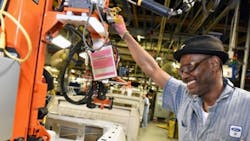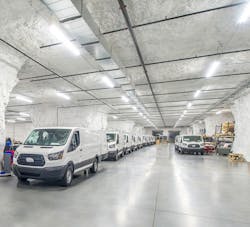Kansas City's Auto Hub Keeps Expanding
In the past two years eleven suppliers to Ford and GM set up shop in Kansas City, Missouri. These suppliers created 1,795 new jobs paying $74.1 million and occupying more than 2.2 million sq. ft. of industrial real estate.
That’s a lot of new business.
“Our region’s strategic role in the growth of Ford and GM will continue to drive new investment from the auto industry and its suppliers,” said Chris Gutierrez, president of KC SmartPort, which supports logistics opportunities in the 18-county, bi-state Kansas City region.
Kansas City (KC) is the country’s second largest auto hub. And its history of auto production dates back to 1913 when Henry Ford chose this region for production making it the company’s first investment outside of Detroit.
Ford Motor Co.’s most recent expansion in the area was in 2011 when the company announced a $1.2 billion investment to retool and expand Kansas City Assembly Plant, located in Claycomo. This plant produces the F-150 and the Transit full-size van.
“We felt very confident in the talent and availability of the workforce when we decided in 2011 to expand operations at the plant which meant adding 3,000 more jobs,” explained Birgit Behrendt, vice president, Global Programs & Purchasing Operations, Ford Motor Co.
She explained that part of that confidence was due to Ford’s strong relationship with area school districts which supports the company’s Next Generation Learning initiative. That initiative, which was launched in 2006, provides financial support, coaching, mentoring and technical support to 20 communities in the U.S.
“In addition to our educational efforts, other companies such as Magna International, are setting up training centers which will continue to provide skilled workers for the entire auto supply chain,” said Behrendt.
In September of 2015 LMV Automotive, a division of Cosma International, which is an operating unit of Magna International, the world’s second-largest automotive supplier, opened a state-of-the-art training center at its new Liberty, Mo. facility. The center includes training for assembly technologies, such as robotic spot and MIG welding, and will be used to develop the weld technicians, tooling technicians and maintenance personnel.
All of this trained talent will be necessary for Ford to fulfill its strategies goals. “The F-150 and Transit Van are the backbone of Ford’s growth … these two vehicles make Kansas City the largest plant by volume globally for Ford,” said Behrendt, when she spoke at KC Velocity in May, an event sponsored by KC SmartPort.
And with this large volume is the need to have a solid relationship with suppliers. “We partner with our suppliers for the long term,” said Behrendt. “We moved away from annual contracts a long time ago as we want our suppliers to know it’s a partnership for the life of the product.”
These long term ties are a boon to suppliers who now feel comfortable signing long term leases in Kansas City. “We have suppliers that sign seven and ten year leases,” said Guitierrez. “It used to be three years.” Some suppliers, and their products, who have come to the region in the past few years include, Group Antonlin ( headliners), Inergy Automotive Systems (fuel tanks), Martinrea International (engine cradles), US Farathane (plastic injection-molded parts) and Yanfeng, US, ( floor consoles).
Ford is not the only customer of these suppliers as GM’s Fairfax Assembly and Stamping Plant, which produces the Buick LaCrosse , LaCrosse eAssist, Chevrolet Malibu 2.5L, Malibu Eco & Malibu Turbo, invested $600 million in the plant in 2013. In the past ten years the company has invested $2 billion in the plant, which employs 3,500. While this plant was built in 1987, GM first came to this area in the 1920’s.
“GM’s Kansas City plant is one of the most efficient and highest quality rated plants in the GM network," explained Bill Kulhanek, plant manager at the KC Velocity event.
Innovative Supply Chain
Another interesting supply chain structure is called Automotive Alley. It’s a combination of above- and below-ground real estate linked by truck-friendly roads that enable vehicles to have access to both the Ford and GM plants.
Part of Automotive Alley is located 100 feet below ground in Hunt Midwest's SubTropolis where automotive tenants lease 360,000 square feet. SubTropolis is a subterranean fortress made from limestone that is six times stronger than concrete and it has a constant ambient temperature and low humidity which eliminates the need for heating or cooling and thus provides low energy rates.
Directly above the underground space, Automotive Alley also encompasses part of Hunt Midwest Business Center, a surface business park that stretches across 1,800 acres. Automotive users currently occupy 100 plus acres -- including Ford’s North American Vehicle Logistics Outbound Shipping facility, which is attracting more Ford Qualified Vehicle Modifiers and Ship-Thru vendors to the area.
The overall strength of the area’s logistics is not lost on Ford. “KC offers Ford the ultimate integrated supply chain … a world-class logistics hub where we can ship product to the world from KC to support our customers across the globe,” said Behrendt. She said her suppliers also ship from KC to support other Ford factories.
Recently, the National Real Estate Investor rated KC as the number one mid-country intermodal markets. “For companies looking to serve 80% of the population in two days’ transit time, and seeking multi-modal transportation options, Kansas City is a great distribution choice,” said Rich Thompson, global head of supply chain consulting with JLL Thompson. It is located at the crossroads of four major interstate highways, and has direct rail and intermodal rail options via the BNSF.
Other logistic assets include the 1,340-acre KC Southern Intermodal Logistics Center and the 260-acre Riverside Horizons Business Park, home to Yanfeng USA’s $45 million manufacturing facility supplying that supports GM. The city has the largest rail center in the U.S. by tonnage and has more foreign trade zone space than any other U.S. city (more than 10,000 acres.)
All of these logistic assets helped develop the strong automotive sector. The State recognized that it must work hard to ensure that the auto industry doesn’t uproot its plants and in 2010 it passed the Missouri Manufacturing Jobs Act. This legislation provided tax incentives, which also contributed to Ford's ability to commit to the Kansas City Assembly Plant. Statistics published by the Missouri Economic Research Information Center show that manufacturers and suppliers in the automotive industry in Missouri have invested $1.29 billion in capital investments, added or retained 14,000 jobs and supported an additional 21,000 jobs since the original Manufacturing Jobs Act was passed.
And there is every indication that the automotive sector will continue this growth. In fact Behrendt found herself promoting the area when she heard that one of the company’s Turkish supplier was thinking of locating in the U.S. She contacted Gutierrez and suggested that when he traveled to Europe he should extend his trip to Turkey to make sure that he met with Turkish suppliers associations.

